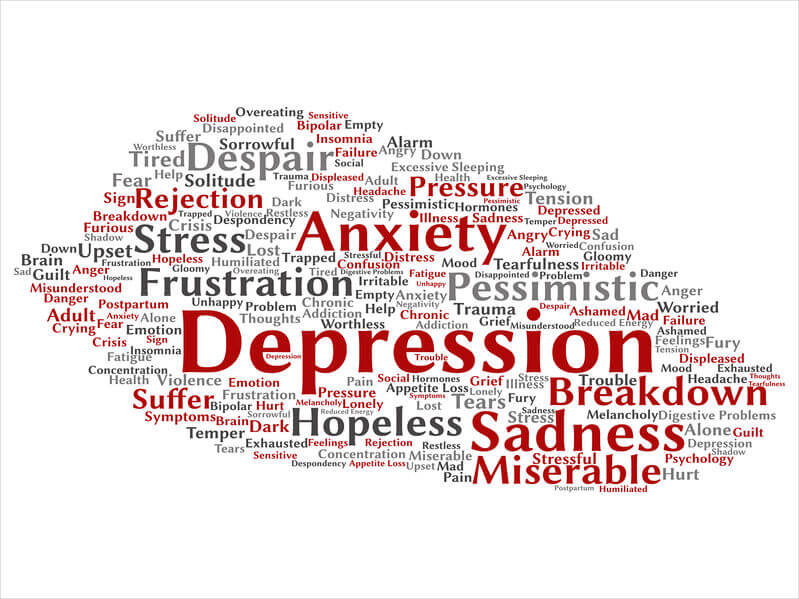What is depression?
Depression is an illness that causes you to feel sad, lose interest in activities that you’ve always enjoyed, withdraw from others, and have little energy. It’s different from normal feelings of sadness, grief , or low energy. Depression can also cause people to feel hopeless about the future and even think about suicide.
Many people, and sometimes their families, feel embarrassed or ashamed about having depression. Don’t let these feelings stand in the way of getting treatment. Remember that depression is a common illness. It affects the young and old, men and women, all ethnic groups, and all professions.
If you think you may be depressed, tell your doctor. Treatment can help you enjoy life again. The sooner you get treatment, the sooner you will feel better.
What causes depression?
Depression is a disease. It’s not caused by personal weakness and is not a character flaw. When you have depression, there may be problems with activity levels in certain parts of your brain, or chemicals in your brain called neurotransmitters may be out of balance.
Most experts believe that a combination of family history (your genes) and stressful life events may cause depression. Life events can include a death in the family or having a long-term health problem.
Just because you have a family member with depression or have stressful life events doesn’t mean you’ll get depression.
You also may get depressed even if there is no reason you can think of.
What are the symptoms?
The symptoms of depression may be hard to notice at first. They vary among people, and you may confuse them with just feeling “off” or with another health problem.
The two most common symptoms of depression are:
- Feeling sad or hopeless nearly every day for at least 2 weeks.
- Losing interest in or not getting pleasure from most daily activities that you used to enjoy, and feeling this way nearly every day for at least 2 weeks.
A serious symptom of depression is thinking about death or suicide. If you or someone you care about talks about this or about feeling hopeless, get help right away.
If you think you may have depression, take a short quiz to check your symptoms:
How is it treated?
Depression can be treated in various ways. Counseling, psychotherapy, and antidepressant medicines can all be used. Lifestyle changes, such as getting more exercise, also may help.
Work with your health care team to find the best treatment for you. It may take a few tries, and it can take several weeks for the medicine and therapy to start working. Try to be patient and keep following your treatment plan.
Depression can return (relapse). How likely you are to get depression again increases each time you have a bout of depression. Taking your medicines and continuing some types of therapy after you feel better can help keep that from happening. Some people need to take medicine for the rest of their lives. This doesn’t stop them from living full and happy lives.
What can you do if a loved one has depression?
If someone you care for is depressed, the best thing you can do is help the person get or stay in treatment. Learn about the disease. Talk to the person, and gently encourage him or her to do things and see people. Don’t get upset with the person. The behavior you see is the disease, not the person.
Postpartum Depression
Topic Overview
Is this topic for you?
This topic is about major depression triggered by childbirth. It is different from the “baby blues,” which many women have in the first couple of weeks after childbirth. For more information, see Baby Blues .
What is postpartum depression?
Postpartum depression is a serious illness that can occur in the first few months after childbirth. It also can happen after miscarriage and stillbirth.
Postpartum depression can make you feel very sad, hopeless, and worthless. You may have trouble caring for and bonding with your baby.
Postpartum depression is not the “baby blues,” which usually go away within a couple of weeks. The symptoms of postpartum depression can last for months.
In rare cases, a woman may have a severe form of depression called postpartum psychosis . This is an emergency, because it can quickly get worse and put her or others in danger.
It’s very important to get treatment for depression. The sooner you get treated, the sooner you’ll feel better and enjoy your baby.
What causes postpartum depression?
Postpartum depression seems to be brought on by the changes in hormone levels that occur after pregnancy. Any woman can get postpartum depression in the months after childbirth, miscarriage, or stillbirth.
You have a greater chance of getting postpartum depression if:
- You’ve had depression or postpartum depression before.
- You have poor support from your partner, friends, or family.
- You have a sick or colicky baby.
- You have a lot of other stress in your life.
You are more likely to get postpartum psychosis if you or someone in your family has bipolar disorder (also known as manic-depression).
What are the symptoms?
A woman who has postpartum depression may:
- Feel very sad, hopeless, and empty. Some women also may feel anxious .
- Lose pleasure in everyday things.
- Not feel hungry and may lose weight. (But some women feel more hungry and gain weight).
- Have trouble sleeping.
- Not be able to concentrate.
These symptoms can occur in the first day or two after the birth. Or they can follow the symptoms of the baby blues after a couple of weeks.
If you think you may have postpartum depression, take a short quiz to check your symptoms:
A woman who has postpartum psychosis may feel cut off from her baby. She may see and hear things that aren’t there. Any woman who has postpartum depression can have fleeting thoughts of suicide or of harming her baby. But a woman with postpartum psychosis may feel like she has to act on these thoughts.
If you think you can’t keep from hurting yourself, your baby, or someone else, see your doctor right away or call 911 for emergency medical care. For other resources, call:
- The national suicide hotline at 1-800-273-TALK (1-800-273-8255).
- The National Child Abuse Hotline at 1-800-4-A-CHILD (1-800-422-4453).
How is postpartum depression diagnosed?
Your doctor will do a physical exam and ask about your symptoms.
Be sure to tell your doctor about any feelings of baby blues at your first checkup after the baby is born. Your doctor will want to follow up with you to see how you are feeling.
How is it treated?
Postpartum depression is treated with counseling and antidepressant medicines. Women with milder depression may be able to get better with counseling alone. But many women need both. Moms can still breastfeed their babies while taking certain antidepressants.
To help yourself get better, make sure you eat well, get some exercise every day, and get as much sleep as possible. Get support from family and friends if you can.
Try not to feel bad about yourself for having this illness. It doesn’t mean you’re a bad mother. Many women have postpartum depression. It may take time, but you can get better with treatment.




